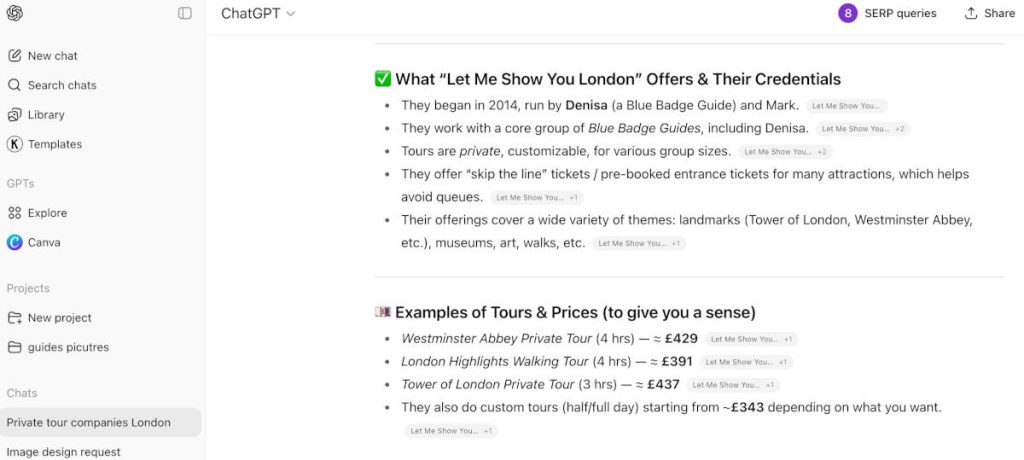Remember last week when I wrote about AI platforms sending traffic to tourism operators? OpenAI just collapsed our timeline from eighteen months to today. ChatGPT users can now book directly through the chat interface. No redirect. No friction. Purchase confirmed.
The game just changed completely
From Discovery to Transaction: The Instant Checkout Revolution
OpenAI’s announcement yesterday represents the most significant shift in tourism distribution since online booking. U.S. ChatGPT users can already purchase from Etsy sellers directly in chat. Over a million Shopify merchants will join soon, including major brands like Glossier and SKIMS.
For London tourism, this changes everything. A visitor asking ChatGPT for “private Churchill War Rooms tour next Tuesday” can move from query to confirmed booking without leaving the conversation. The Agentic Commerce Protocol, open-sourced with Stripe, means any operator can theoretically enable this today.
Here’s the critical detail: Stripe merchants can integrate with one line of code. One line. While competitors struggle with legacy booking systems, early movers capture market share that becomes increasingly difficult to reclaim.
You snooze, you lose!
Our operational data from 5,000 tours reveals why this matters: international visitors, particularly the 50% from North America, already use AI platforms extensively for travel planning. As I wrote last week, travellers increasingly rely on AI for recommendations. They value convenience, and they book experiences that reduce friction.
When multi-language AI breaks down discovery barriers, London operators with AI booking capture visitors who previously defaulted to familiar brands. The operational excellence we’ve built—Blue Badge guide networks, accessibility expertise, cultural knowledge—means nothing if visitors can’t book it seamlessly.

The Technical Reality Check
Let’s be clear about requirements. AI booking isn’t just adding a widget. Successful integration demands:
Structured availability data. Real-time inventory that AI can query and confirm. “Next Tuesday at 2pm” must return accurate availability instantly.
Clear pricing logic. Dynamic pricing, group discounts, and seasonal variations—all must be machine-readable. Ambiguity kills conversions.
Instant confirmation capability. When ChatGPT books, customers expect immediate confirmation. Manual approval processes won’t work.
Comprehensive service descriptions. AI needs to understand exactly what you offer, who it suits, and what’s included. Vague marketing language fails here.
These aren’t future requirements. They’re necessary today. Operators using modern booking platforms can adapt quickly. Those on legacy systems face a fundamental disadvantage.
The Competitive Bloodbath Ahead
Within 90 days, London tourism will be divided into two categories: bookable through AI and invisible. No middle ground exists. When visitors can book some experiences directly through ChatGPT but need to visit separate websites for others, convenience wins every time.
Consider the current landscape. Generic tour aggregators built businesses on comparison shopping. AI booking bypasses them entirely. Small operators with clear specialities and modern systems can compete directly with established players. The democratisation seems positive until you realise the inverse: operators who don’t adapt disappear completely.
Our 30,000 visitors taught us that convenience drives decisions more than price. The ability to book immediately, in conversation, without switching contexts or entering payment details repeatedly? That’s worth a premium. Operators who enable this capture higher-margin bookings.
Your 90-Day Action Plan

The window for first-mover advantage closes fast. Here’s what separates winners from casualties:
Week 1-2: Technical assessment. Can your booking system support API integration? If using Stripe, you’re nearly there. If not, evaluate switching costs immediately.
Week 3-4: Data structure. Organise availability, pricing, and service information for machine reading. This isn’t SEO—it’s operational infrastructure.
Week 5-6: Integration testing. Whether through Shopify, direct API, or third-party providers, establish your connection to AI platforms.
Week 7-12: Optimisation and scaling. Monitor AI bookings, adjust descriptions based on successful conversions, and expand availability.
The £15.3 billion accessible tourism market particularly benefits from AI booking. When visitors specify requirements—wheelchair access, sensory considerations, dietary restrictions—AI matches needs with services instantly. Operators with clear accessibility information gain disproportionate visibility.
The Moment of Truth
After coordinating thousands of tours through London’s evolution—from print guides to TripAdvisor to social media—I’ve never seen a shift this fundamental happen this fast. The infrastructure for AI commerce exists today. Early adopters lock in advantages that compound exponentially.
London can lead global tourism’s AI transformation or become a cautionary tale of missed opportunity. The next 90 days determine which story we tell.
The operators who recognise AI booking as infrastructure, not innovation, will define London tourism’s future. The question changed from “when will AI reshape tourism?” to “will you be bookable when your next customer asks ChatGPT?”
